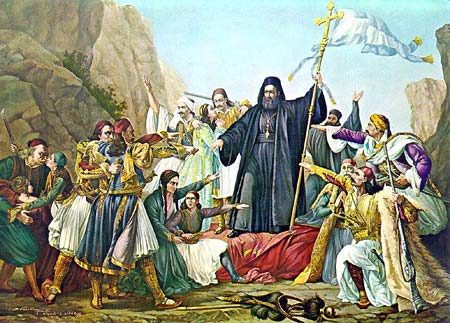 Target: Tinos by Jeffrey Siger
Target: Tinos by Jeffrey SigerDo you save the best for last or eat it first? I tend to be a saver. I like to set aside some books I'm looking forward to reading in a stack called "compensation for loss, injury, or suffering." Then, I can salvage a bad day with a great nighttime read. Recently, a dinner concocted by my husband (don't ask) sent me reeling to this stack, where I grabbed Jeffrey Siger's Target: Tinos.
Chief Inspector Andreas Kaldis is head of Greece's special crimes division, or, in other words, "Greece's number one cop for all things nasty." "Nasty" perfectly describes the murder of two men on the island of Tinos. Their bodies are found, along with tattered remnants of a Greek flag, chained together and burnt to a crisp, in the back of a van. In a cylinder chained to the steering wheel is a note: "Revenge or Death." This appears to be a variation of the Greek battle cry and motto, "Freedom or Death." Media coverage goes nuts. There are competent cops on Tinos, but Minister of Public Order Spiros Renatis, Andreas's boss, wants him to head the investigation.
 |
| Tinos |
 |
| Interior of the Panagia Evangelistria, which contains a holy icon of the Virgin Mary called the Megalochari |
In addition, Spiros is worried about Greece's position in the European Union. The country's financial problems are bad enough. Adversaries have described Greeks as too lazy, corrupt, and selfish to pay taxes. Of 11.5 million Greeks, 10 percent are immigrants, and, as in other countries, some citizens blame every lost job and criminal act on the immigrant population. If these homicide victims are immigrants, Greece's detractors could seize upon this crime as an excuse to further vilify their national character. Greeks could be attacked as callous, indifferent to the plight of non-Greeks. A bad outcome for Greece is the denial of bailout funds; a worse outcome is being drummed out of the European Union. This crime must be solved.
 |
| Because some pilgrims approach the Panagia Evangelistria on their knees, red carpet has been laid to facilitate them. |
 |
| Tinos, scene of the crime, and Mykonos, site of the wedding, are islands in the Cyclades, southeast of Athens |
Whereas Andreas is the son of a cop and grew up in a working-class family, his fiancée Lila, a young widow and art historian, comes from one of Greece's oldest and wealthiest families. I was worried when Andreas became involved with the lovely Lila in the second series book, Assassins of Athens. Too often in crime fiction, when a socially prominent character is tied to a working-class sleuth, the sleuth's boundless resources seem ridiculous. Or, the relationship has the whiff of romantic fantasy. My concern was misplaced. Lila's wealth means that Andreas won't count his pennies, but she is down-to-earth, feisty, and fun. Her position in society allows Siger to show us how upper-class Greeks live, in addition to those of lower income. Lila's relationship with Andreas, including their intimate moments, is very well done, and the traditions involved in their wedding are fascinating.
 |
| Bishop Germanos of Patras raises the Greek flag in 1821 and begins the fight for Greek independence |
This book is a wonderful read. A reader explores the island of Tinos, learns about its geography and history, and meets colorful characters, while Andreas tracks the murderer of the two young tsigani and prepares to formalize his ties to Lila. While it's not imperative to read the series in order (Murder in Mykonos, Assassins of Athens, Prey on Patmos, and Target: Tinos), it's satisfying to do that because the books form Andreas's continuing professional and personal story. They cover various topics and take place in different locations in Greece. I hope the future brings more details about the personal lives of Siger's secondary characters. I'm really looking forward to the next book, due in October 2013.
If you're a saver, put this one in your own "compensation" stack to be read when you deserve a treat. Or, if you're not a saver, read it now. I'm not the only one who thinks Target: Tinos is terrific; The New York Times critic Marilyn Stasio recommended it, and the Publishers Weekly reviewer gave it a starred review. I have every faith that you'll enjoy it, too.
Notes: We'll learn more about author Jeff Siger, who's lucky enough to live on Mykonos, in his upcoming Read Me Deadly interview.
I received a free review copy of Target: Tinos, published in June 2012 by Poisoned Pen Press.
 |
| Mykonos looks like paradise, doesn't it? |


No comments:
Post a Comment